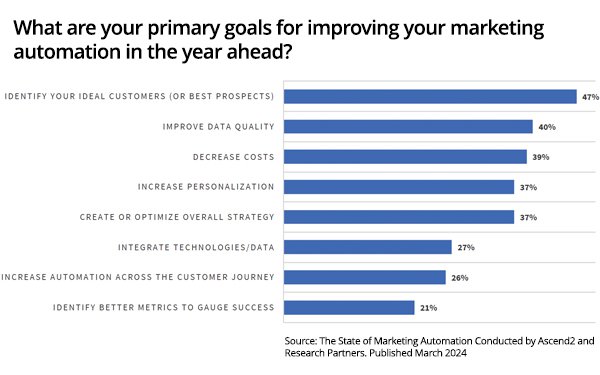
Marketers are feeling good
about themselves. Twenty-eight percent rate their marketing automation strategy as best-in-class -- a 3% increase vs. 2023, according to The State of Marketing Automation 2024, a study from
Ascend2.
Another 69% of marketers say they are successful, while only 3% admit to being unsuccessful.
Only 9% of marketers say their customer journey is
fully automated, but 32% claim it is mostly so, while 59% say they are partially there.
In addition, 68% are increasing their marketing automation budgets in the
coming year -- 14% significantly -- and 24% expect to remain the same. Another 9% are expecting moderate decreases, and only 2% are expecting significant declines.
What do they hope to
achieve?
- Identify ideal customers (or best prospects) — 47%
- Improve data quality — 40%
- Decrease
costs — 39%
- Increase personalization — 37%
- Create or optimize overall strategy — 37%
- Integrate
technologies/data — 27%
- Increase automation across the customer journey — 26%
- Identify better metrics to gauge success —
21%
advertisement
advertisement
But there are challenges in using automation to improve performance:
- Collecting quality data —
52%
- Creating an overall strategy — 47%
- Allocating budget and resources —
41%
- Building effective customer buying journeys — 40%
- Integrating technologies/data — 40%
- Identifying better metrics to gauge success — 37%
Email marketing is the leading area for marketing automation, with 58% of marketers
utilizing it for email. Although the percentage is down from 63% last year, that may be because more companies have already automated in this area.
Social media management is second,
with 49% using automation for this channel. That’s down slightly from 50% in 2023. Otherwise, few areas are automated in comparison with last year.
One exception
is SMS — it’s up to 30%, versus 28% last year.
And 28% are now using automation for campaign tracking, up from 28% in 2023. Live chat has gone from 21% to 24%. Dynamic web forms
and lead scoring, both scoring in the teens, have seen increases.
AI is increasingly being applied. The most effective areas are:
- Targeting audiences — 45%
- Analytics and reporting — 39%
- Email marketing — 36%
- Content creation — 34%
- Personalization — 33%
- Customer service—28%
- Lead generation and qualification — 25%
- Campaign/channel optimization — 14%
Meanwhile, 89%
feel the tool they use makes it easy to build customer journeys and 30% agree strongly, with 59% saying they agree somewhat. Another 11% disagree, but only 1% have strong feelings about it.
Ascend2 and its research partners surveyed 387 marketing decision makers. Of these, 21% are in B2B, 46% in B2C and 33% B2B and B2C equally. In addition, 23% are in
companies with more than 500 employees, 33% in firms with 59 to 500 employees, and 44% are in companies with fewer than 50.